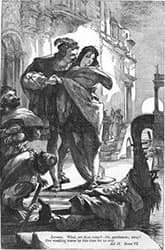The Merchant of Venice
Critique • Quotes
 Illustration, 1830 edition
Illustration, 1830 editionFirst publication
1597
Literature form
Play
Genres
Comedy, drama
Writing language
English
Author's country
England
Length
Five acts, 2,701 lines, approx. 22,000 words
Notable lines
In sooth I know not why I am so sad,
It wearies me, you say it wearies you;
But how I caught it, found it, or came by it,
What stuff 'tis made of, whereof it is born,
I am to learn.
— First lines
If to do were as easy as to know what were good to do, chapels had been churches, and poor men’s cottages princes’ palaces.
The man that hath no music in himself,
Nor is not moved with concord of sweet sounds,
Is fit for treasons, stratagems, and spoils.
All that glisters is not gold,
Often have you heard that told.
Many a man his life hath sold
But my outside to behold.
Gilded tombs do worms infold.
He hath disgrac'd me and hind'red me half a million, laugh'd at my losses, mock'd at my gains, scorned my nation, thwarted my bargains, cooled my friends, heated mine enemies. And what's his reason? I am a Jew. Hath not a Jew eyes? Hath not a Jew hands, organs, dimensions, senses, affections, passions? Fed with the same food, hurt with the same weapons, subject to the same diseases, healed by the same means, warmed and cooled by the same winter and summer as a Christian is? If you prick us, do we not bleed? If you tickle us, do we not laugh? If you poison us, do we not die? And if you wrong us, shall we not revenge? If we are like you in the rest, we will resemble you in that. If a Jew wrong a Christian, what is his humility? Revenge. If a Christian wrong a Jew, what should his sufferance be by Christian example? Why, revenge! The villainy you teach me I will execute, and it shall go hard but I will better the instruction.
The quality of mercy is not strain'd,
It droppeth as the gentle rain from heaven
Upon the place beneath. It is twice blest,
It blesseth him that gives and him that takes.
'Tis mightiest in the mightiest; it becomes
The throned monarch better than his crown.
His sceptre shows the force of temporal power,
The attribute to awe and majesty,
Wherein doth sit the dread and fear of kings;
But mercy is above this sceptred sway,
It is enthroned in the hearts of kings,
It is an attribute to God himself;
And earthly power doth then show likest God's
When mercy seasons justice. Therefore, Jew,
Though justice be thy plea, consider this,
That in the course of justice none of us
Should see salvation. We do pray for mercy,
And that same prayer doth teach us all to render
The deeds of mercy.
Well, while I live I'll fear no other thing
So sore as keeping safe Nerissa's ring.
— Last lines
Critique • Quotes

